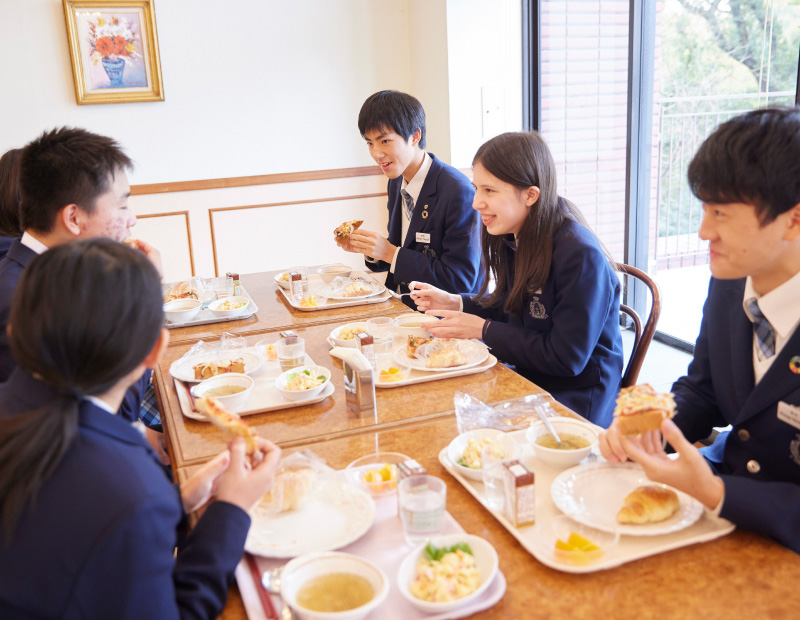
At Linden Hall School, both elementary and high school students consume vegetables and rice grown in organic and chemical-free local farms, fresh eggs gathered that morning at local poultry farms, as well as domestically produced meat and fish. Every morning, fresh vegetables are delivered, which we cook in the elementary and junior high school cafeteria kitchens.
Our decision to provide organic school lunches came with various hurdles, such as identifying and collaborating with the suppliers, balancing costs, and reconsidering the menu (for example, to use only vegetables in-season).
Many kinds of vegetables are needed to make a balanced school lunch. Although certain organic vegetables can be grown easily, obtaining the amount needed for a school-wide lunch every day is easier said than done.
With the cooperation of local farms that support the idea of growing organic vegetables to promote youth’s physical development, Linden Hall School, registered dietitians, and chefs have joined forces since 2020 to provide the first year-round organic food service at a school in Japan. *
As part of our Shokuiku, or food and nutrition education programme, students compost vegetables and fruit skins leftover from school lunches, and use the product on the school grounds to grow more vegetables. This has helped students to better understand environmental systems and raised our awareness of environmental and food wastage issues.
*In January 2020, Linden Hall Elementary School made the switch to serve organic lunches. In January 2021, Linden Hall High School followed suit.
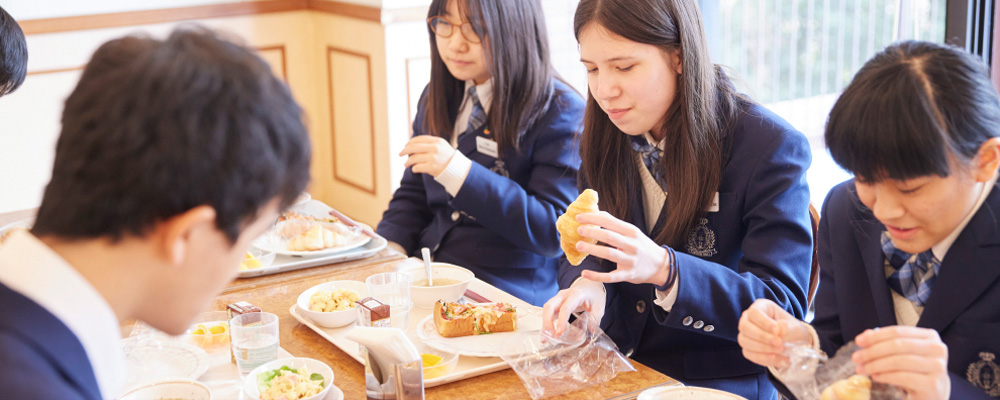
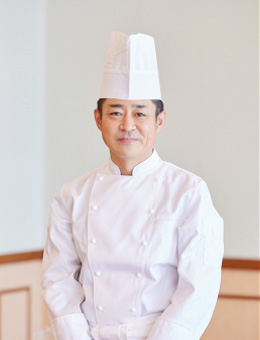
Head of the Food Service Department
After learning the art of Western and Japanese cuisine at hotels and restaurants in Japan, Kota Sugimoto travelled to France to train at a one-star restaurant. After returning to Japan, he worked as the head chef at several hotels and restaurants, and in 2010, he became the head chef of Tsuzuki Ikuei Gakuen.
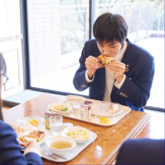


The lunches at Linden Hall School are made by a team of farmers who grow organic vegetables, nutritionists who advise on menus that balance nutrition suitable for youth's development and seasonal ingredients, and cooks who ensure that the meals are tasty.
Organic school lunches inherently incorporate nature’s seasons. While most school lunches use ingredients available at any time of the year, organic school lunches must take into account what vegetables are in season.
Furthermore, compared to commercially available vegetables, organic vegetables must be grown and handled with special care. However, we do not wish to compromise on the quality of the food we serve, as we believe strongly in the great impact of what youth consume on their development. I have had the honour to be involved in this project since its inception, and the idea of organic school lunches has only become reality through much experimentation, trial and error. As a chef, I take great pride in being able to provide our students lunches that use organic, locally-produced vegetables full of vitamins and minerals.

Registered Dietitian
I believe that organic vegetables have much more vitality and provide a much better source of energy than do commercially available vegetables grown with many chemicals. I hope to support students’ development by providing them food made with such high quality ingredients.
Our lunch menus consist primarily of Japanese dishes, and we are careful to flavour them in a way that does not detract from the naturally delicious taste of the vegetables. We also make great effort to ensure sufficient protein is included to support the students’ physical growth.
It is my hope that through our organic lunches, we inspire students to be aware of the impact of their food choices on their own development.

Professional Chef
Seasonal vegetables oftentimes have a distinctive taste, and while adults may find them delicious, some children may not. For example, the egumi, or harshness, of leafy vegetables may not be so “kid-friendly”. However, egumi is abundant in high quality vegetables and is considered an essential ingredient in many Japanese dishes. While we have included lots of beautiful seasonal vegetables in our lunch menus, if students do not eat the lunches, we certainly would not be able to contribute to their physical growth. Therefore, I make every effort I can to make the lunches tasty and easy to eat. I am quite particular about the various processes involved in preparing Japanese dishes, soup stock and seasoning.
Our school does not use any dairy products in our school lunches. A registered dietitian has carefully designed our menu so that it includes the appropriate amount of calcium from ingredients other than milk.
For potages and other creamy dishes, we use soy milk and soy cheese, which are both rich in protein.
We are also particular about the seasonings we use. Our miso and soy sauce is additive-free, our vinegar is organic, our oil is made from non-GMO rapeseed, and our sweetener is cane sugar. Each of these seasonings is ordered from different, carefully selected, stores.
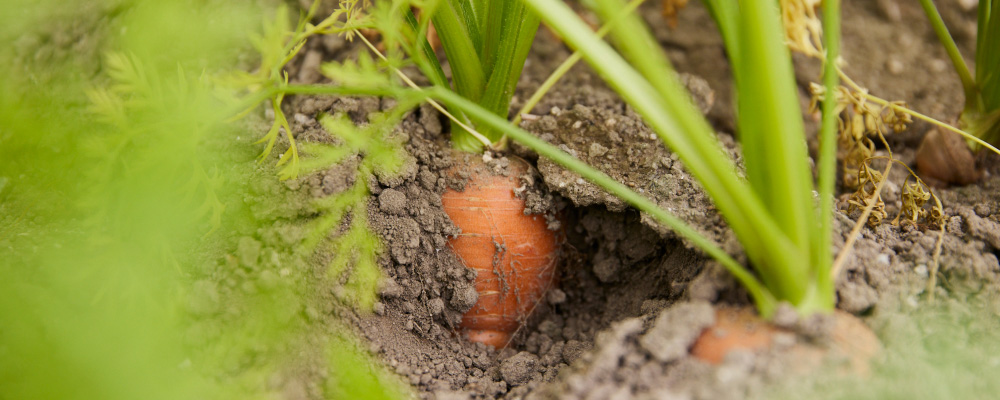
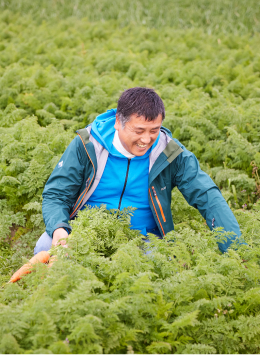
Organic Papa Co., Ltd./Representative Director
General Incorporated Association Organic Papa Unity / Representative Director

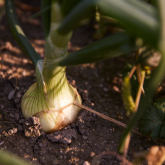
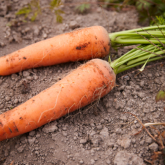
All the crops grown on our farm are organic and completely pesticide-free. We have adopted farming methods that closely resemble the processes that occur in nature, which are also those used in Japan before the advent of chemical farming methods. These methods mimic the relationship between plants and soil in nature. We employ fertiliser composed only of plant-based materials such as fallen leaves, material leftover after pruning, and sawdust. These carbon-based materials are returned to the soil, where they are decomposed by microorganisms and absorbed as fertiliser by plants. Preparing high quality soil is critical for organic farming. The crop absorbs nutrients from this high quality soil, resulting in nutritious vegetables filled with vitality.
The reality is that there is a vast difference between the amount of time and effort needed to grow food crops using conventional farming methods versus organic farming methods. However, we cannot close our eyes to the fact that more than 90% of the human body is made up of water and proteins, which are formed from the food we consume. We need to ask ourselves, “What do we want to form our bodies of?” I think that organically grown food is the most obvious answer. For youth at the peak of their physical development, what they eat is even more critical. By providing youth at this important developmental period organic meals, the next generation can form not only healthy bodies, but also a healthy palate. I feel it is our mission and responsibility as adults to serve healthy food.
Most chemicals we consume accumulate in our bodies and are not excreted. It is thought that this continual accumulation of chemicals is causing many “modern” health issues such as allergies, eczema, and mental health problems. I give lectures at schools about the effects of dietary habits, and I think Shokuiku is the best way to inspire our society as a whole to go organic. I feel that Linden Hall School, which takes the realisation of organic school meals as well as food and nutrition education so seriously, puts first the needs of its students. I cannot help but be compelled to support its vision.
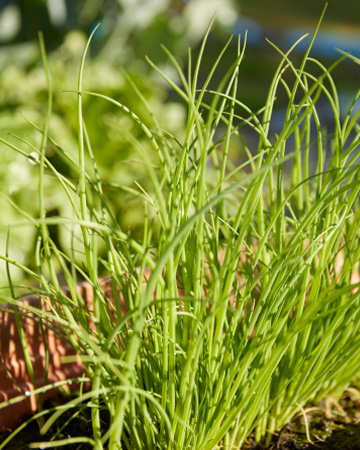
In addition to providing organic meals, Linden Hall School also has put great effort into providing Shokuiku.
Students compost vegetables and fruit skins leftover from school lunches, and use the product on the school grounds to grow more vegetables. These vegetables are harvested and used to cook more school lunches. This is also an educational opportunity for students to obtain a real feel for what our bodies are made of.
Finally, we seek through our food and nutrition education efforts to teach students the relationship between eating habits and the environmental issues, such as pollution, food waste and the climate.


Loading